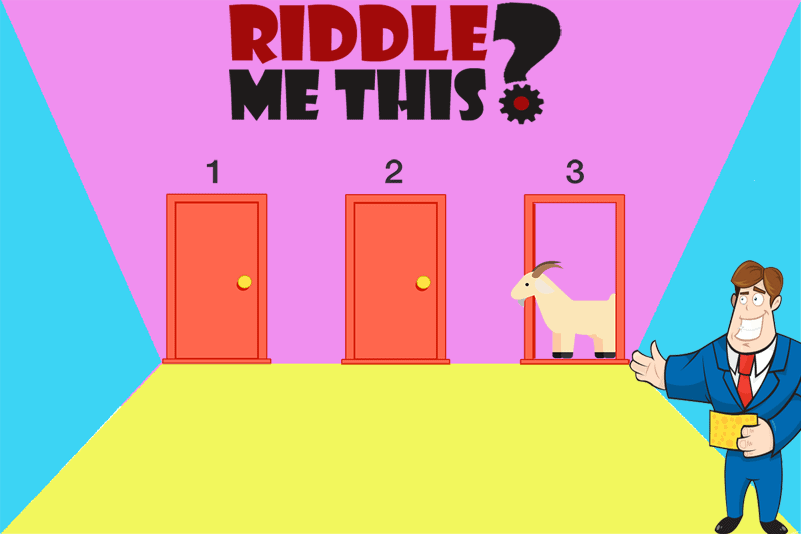Test your skills of deduction with the November 2021 edition of Riddle Me This: The Game Show
You are a contestant on a game show. There are three closed doors in front of you. The game show host tells you that behind on of these doors is a million dollars in cash and that behind the other two doors there are goats. You do not know which doors contain which prizes, but the game show host does.
The game you are going to play is very simple: you pick one of the three doors and win the prize behind it. After you have made selection, the game show host opens one of the two doors that you did not choose and reveals a goat. At this point, you are given the option of whether to stick with you original door or switch your choice to the only remaining closed door.
What would you do and why?
Click to Reveal Answer








I would stick with my original choice as I wouldn’t trust the game show host especially if he wrote the riddle because there are at least two errors, one in the third sentence where the word on should be one and one in the last sentence of the second paragraph where the word you should be your. So the game show host couldn’t be trusted.
I don’t agree with the answer. A person has a 50 percent chance regardless of whether they change their selection.
Why do you have a 2/3 chance of winning by switching doors? It seems to me the chances are 50/50 for either door.
I disagree with the answer to today’s puzzle. The supposed 2/3 chance of winning if you change doors is predicated on the host immediately opening the door if you selected the correct door. If the host opened the door with the goat to get you to change your door selection because you selected the door with the million dollars the first time, and then you change your mind by choosing the other remaining door instead after seeing the goat behind the first door, you would have lost the million dollars because you changed your selection. The probability of winning is really 1 chance in 3 regardless of how you want to look at the problem.
The key is whether the host is required to open a door every time, which is not clearly specified in the statement of the question. If in fact he must open a door and show you a small prize, it is always better to switch based on the reasoning supplied in your answer. If in fact the host does not always show you another door, but can choose whether or not to show you, so it was his choice to show you what is behind a door, it becomes a two player game with totally different probabilities instead of a one player game.
If the host is ALWAYS required to do the following 2 steps after you select a door 1) Open a door with a goat behind it AND 2) is then required to offer you to switch doors, then your chances are always 50:50 because no matter what door you pick he will remove one and you have a choice between 2 doors (i.e., 50:50 chance). If the host can decide not do either step 1 or 2, then as Roy stated it becomes a two player game and the odds change depending on what the host does or does not do.
The reasoning presented in the answer is correct. Although it builds on inferences not clearly stated in the problem. At initial selection, there are three options and one prize. So the probability of getting the prize is 1/3, and the probability of selecting a goat is 2/3. However, regardless of what is selected, the host always stops play before the selected door is opened and opens one of the other two doors and always reveals a goat. The host then gives the option of switching doors. If the initial selection was the prize, a probability of 1/3, then switching doors will result in a goat. If the initial selection was a goat, a probability of 2/3, then switching doors will result in a prize. So odds are much better by switching. Human nature has fear of regret in switching doors at the appearance of a coin flip, so most people do not want to switch doors.
I kept thinking about this and keep coming up with 50/50 with 2 doors left to open.
The key to understanding this is to understand that (1) a single door is chosen and (2) the host then opens all of the remaining doors except one. This leaves 2 doors to choose from. In this case, that means only 1 door is revealed to not contain the prize (and 2 doors remaining–one of which does contain the prize). Although it appears to be 50-50, it is not. This is evident if you imagine there are 100 doors with 1 prize. You have a 1% chance of picking the prize with your initial guess, and a 99% chance the prize is behind any of the other doors. Then 98 of the 99 doors are opened. Now the prize is either behind the original door or the remaining door. Your original choice still has a 1% chance of being right. So the other door has a 99% chance of holding the prize. In this case, it is obvious that you would switch. You are exchanging a 1% chance of winning to a 99% chance of winning. So back to the original riddle, you are exchanging a 33% chance of winning with a 66% chance of winning. It doesn’t mean you will win, it just means that if you played this gave enough times you would win more often.